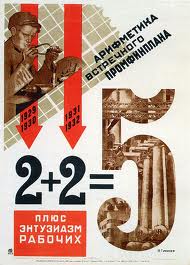In a previous post I commented about use of comedy, satire, absurdity and fantasy in Russian literature to mask political or social commentary, and hopefully avoid censorhip. I found in the first chapter of Master and Margarita what could be read as a critique of policies that were at the foundation of the Communist Party’s attempt to realize a socialist/non-capitalist economy in the Soviet Union—the Five Year Plans.
But first a brief overview of the history of Soviet economics:
According to Marxist-Leninist ideology, anything that promotes capitalism, especially manufacturing and/or selling things for profit, was not only passé, it was decidedly counter-revolutionary. So the challenge for the U.S.S.R. was to promote a modern, industrial economy without market mechanisms; no producing for “the market”, no profit, no private property. They even experimented with outlawing money and banking. As the industrial proletariat was to control the means of production, and the Communist Party was the “vanguard of the proletariat”, then it was reasoned that the Party should control all property, and all economic activity, through the structure of the Soviet state. As the state, then, became responsible for directing production, under Stalin the Party in 1928 unveiled the first Pyatiletki, or “5-Year Plan”.

the Plan was big. In theory, it accounted for everything that would be produced in the U.S.S.R., and how much of it, where, by who, and with what resources, over a period of five years. In addition, the warehousing and distribution of everything from raw materials to consumer goods, was determined by the plan. After that five years was up, a new five year plan was announced. This way of organizing the economic life of every citizen of the Soviet Union held sway for more than sixty years; there were thirteen Five-Year Plans, covering every year since 1928. The last Plan was announced months before the breakup of the Soviet Union in 1991.

The Plan was the object of both a special pride, and quiet derision. On one hand it could be said to be responsible for the rapid industrialization of the 1930s that allowed the Soviet Union to meet the threat of Nazi Germany, and ultimately defeat the Nazis in World War Two (or Great Patriotic War as it was, and is, known in Russia). On the other hand it was incredibly inefficient, and saw chronic shortages, especially of consumer goods, and often of food. Yes, even agricultural production was “planned”, and the plan was implemented by state run “farm collectives”. One couldn’t get away from the Plan. And the state driven media, and arts, were constantly exhorting citizens to “fulfill the Plan”. The existence of a pervasive and vibrant black-market economy, though, was tribute the inefficiencies of The Plan.
In the first chapter of Master and Margarita, the conversation—mentioned in an earlier post—of the two writers and the “foreigner” turns to the nature of fate, and man’s ability to control his own destiny, or not. When the foreigner learns that neither the poet nor the editor believe in god, his response is to say, “Oh, how delightful”, and he stands up to shake the editor’s hand say, “Let me thank you from the bottom of my heart”. But he challenges them by asking, “if there is no god, then, I ask you, who governs the life of man and the general order of all things on earth?”. The two citizens quickly agree that “Man governs himself! ”.
The foreigner then elaborates, “Pardon me”, the stranger responded softly, “In order to govern, it is necessary, after all, to have a definite plan for some period, a decent one at least. Allow me to ask you, how can man govern if he not only lacks the ability to make any kind of plan for even a ridiculously short period of time, for, let’s say, a thousand years, but can not give his own account even for the morrow?”
I can’t help but read this as a critique of the whole “Five-Year Plan” thing. His point that a thousand years is “ a ridiculously short period of time” makes five years patently absurd as a period for making a plan to govern the life of man. And the Five-Year Plans were certainly seen as an attempt to govern the lives of citizens of the U.S.S.R.—what kind of work they would do, where they would work, what they would make and what they could buy, eat, wear, see, read and talk about.
This discussion of fate in Master and Margarita puts into question one of the founding philosophies of Leninism—that man is a producte of his environment, and by creating the right environment in which people live, the Party could mold a better human. The mythology of “The New Soviet Man”, a superior, socialist being, came directly from this approach: that some men—the “vanguard”—could direct the lives of all the rest, and thereby create a superman.
